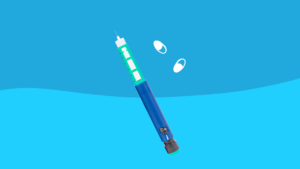Is There a Generic for Trulicity? Side Effects, Costs, Alternatives
HOME | DIABETES EDUCATION | IS THERE A GENERIC FOR TRULICITY? SIDE EFFECTS, COSTS, AND ALTERNATIVE
Trulicity does not have a generic or similar cheaper version available. It can cause stomach issues and injection site reactions as common side effects. Severe effects like pancreatitis require close monitoring.
Healthcare providers determine the weekly dosage, ranging from 0.75 mg to 4.5 mg. Alternatives like Rybelsus, Jardiance, and Metformin offer different benefits.
Making lifestyle changes, like adding fiber to your diet and exercising, can also help manage diabetes. Trying out these alternatives gives you more options for your health.
Main Points
- No generic or biosimilar version of Trulicity is available due to it being a brand-name biologic drug.
- Trulicity’s common side effects include stomach issues and injection site reactions.
- Trulicity dosages range from 0.75 mg to 4.5 mg per week, determined by healthcare providers.
- Consider assistance programs from the manufacturer to save money on Trulicity.
- Alternatives to Trulicity include Rybelsus, Jardiance, Metformin, and natural approaches like diet and exercise.
Trulicity Generic or Biosimilar
Trulicity, a brand-name GLP-1 receptor agonist, doesn’t have a cheaper generic or biosimilar version available. This is because Dulaglutide, the active ingredient in Trulicity, hasn’t been made into a biosimilar yet.
Trulicity contains the active drug dulaglutide. It’s a biologic drug that’s available only as a brand-name medication. It’s not currently available in biosimilar form.
https://www.medicalnewstoday.com/articles/326844#-What-is-Trulicity?
Since Trulicity is a brand-name biologic drug, it can be more expensive. People looking to save money on Trulicity may need to check if there are assistance programs from the manufacturer. Without a generic or biosimilar option, it’s harder to find a cheaper version of Trulicity.
While Trulicity is known to work well in controlling blood sugar and helping with weight loss, its brand status can be costly for some. It’s important to explore other medications and talk to healthcare providers about affordability to manage diabetes effectively.
Side Effects of Trulicity
To understand Trulicity’s side effects, know this:
Common Side Effects: Trulicity can cause stomach issues like nausea, diarrhea, stomach pain, vomiting, and indigestion. These are usually mild and get better over time.
Injection Site Reactions: Expect redness, swelling, or itching where you inject Trulicity. These reactions are temporary and not a big worry.
Rare but Severe Side Effects: Trulicity might lead to pancreatitis, allergies, kidney troubles, or even thyroid tumors, though these are uncommon. Keep an eye out for any signs of these serious side effects and get help if needed.
Trulicity Dosages for Diabetes Management
Trulicity dosages for managing diabetes range from 0.75 mg to 4.5 mg per week. Your healthcare provider will decide the right dose for you. You’ll take Trulicity once a week with an injection pen.
Stick to your dosing schedule to keep your blood sugar levels stable. Trust your healthcare provider to choose the best dose for you.
Alternatives to Trulicity and Options
If you’re looking for alternatives to Trulicity for Type 2 diabetes, consider Rybelsus, Jardiance, and Metformin.
Rybelsus: A pill that helps with weight loss and heart health.
Jardiance: A pill that lowers heart risks and increases glucose removal through urine.
Metformin: A low-cost generic drug often used with other medications for diabetes.
These options can help control blood sugar differently and may be more affordable than Trulicity. Other choices like Januvia and Glipizide have unique effects too.
Lifestyle changes like diet and exercise are also important in managing diabetes. Talk to your doctor to find the best alternative for you.
Rybelsus as a Trulicity Substitute
Looking to switch from Trulicity to Rybelsus for managing type 2 diabetes?
Rybelsus is an oral pill that works like Trulicity but without the need for injections. It helps with weight loss and reducing heart issues, just like Trulicity.
Rybelsus is a good alternative for those who prefer taking a daily pill instead of getting injections. Before making the switch, talk to your doctor for personalized advice.
Both Rybelsus and Trulicity are effective in managing type 2 diabetes, so transitioning to Rybelsus could be a smooth change for you. Stick with the benefits of weight management and heart health by choosing Rybelsus.
Jardiance as a Trulicity Substitute
Looking for a different diabetes medication to go with Rybelsus? Let’s talk about Jardiance as an alternative to Trulicity.
Key Points About Jardiance:
- Type of Medication: Jardiance is an SGLT2 inhibitor.
- How It’s Taken: Jardiance is a pill you swallow.
- Consult Your Doctor: Before switching to Jardiance, talk to your doctor.
Jardiance helps lower blood sugar by making you pee out more glucose. It can also reduce heart risks in people with diabetes. If you’re thinking about replacing Trulicity, ask your doctor if Jardiance could be a good fit for you.
Metformin as a Trulicity Substitute
Consider using Metformin instead of Trulicity for type 2 diabetes. Metformin is a cheaper generic drug that helps control blood sugar by reducing glucose in the liver and increasing insulin sensitivity.
It comes in different strengths and forms for easy dosing. Metformin costs around $16.02 to $22.18 for 100 tablets, making it more affordable than Trulicity.
It’s often used in combination with other medications to manage diabetes effectively. Talk to your doctor before switching to Metformin to ensure it’s safe for you.
Metformin has a good track record in managing type 2 diabetes and can be a helpful part of your treatment plan.
Januvia as a Substitute to Using Trulicity
If you’re looking for an alternative to Trulicity for managing type 2 diabetes, Januvia could be a good option. Januvia helps control blood sugar levels and is generally well-tolerated. However, it doesn’t have FDA approval for heart protection or weight loss like Trulicity does.
Glipizide, a cheaper sulfonylurea, is another option to discuss with your doctor. When choosing between Januvia, Glipizide, or Trulicity, talk to your healthcare provider to find the best fit for your health needs and preferences. It’s important to work together to choose the most effective treatment for you.
Glipizide as a Trulicity Substitute
Glipizide is a cheaper option than Trulicity for managing type 2 diabetes. It helps the pancreas release more insulin to lower blood sugar levels. Unlike Trulicity, Glipizide is a generic medication, making it more affordable. It may cause weight gain and low blood sugar but can be used by those who can’t take Trulicity.
Consult your doctor before switching to Glipizide. They’ll consider your health needs and decide if it’s right for you. By talking about side effects like weight gain and low blood sugar, your doctor can help you choose the best treatment for your diabetes.
Natural Alternatives to Trulicity
To manage Type 2 diabetes without Trulicity, focus on these natural approaches:
Fiber-rich Foods: Eat more fruits, veggies, and whole grains for better blood sugar control.
Cinnamon: Consider adding cinnamon to your diet or taking supplements to help regulate blood sugar levels.
Exercise: Stay active with activities like walking, swimming, or yoga to improve insulin sensitivity and manage blood sugar effectively.
Switching to a Trulicity Alternative
If you’re thinking about trying a different medication instead of Trulicity for diabetes, talk to your doctor first. They can consider things like your health history, possible interactions with other drugs, and the chance of side effects with a new medicine like Ozempic or Rybelsus.
It’s important to work together with your healthcare provider to make sure the switch is smooth and helps manage your diabetes well. Collaborating with your doctor can help find the best option for you and improve your overall health.
Trulicity Vs. Ozempic: a Comparison
When comparing Trulicity and Ozempic for treating type 2 diabetes:
- Type 2 Diabetes Treatment in Adults:
- Trulicity and Ozempic are both used for adults with type 2 diabetes.
- Trulicity can be used for kids aged 10 and up, but Ozempic isn’t for children.
- Lowering Blood Sugar Levels:
- Both Trulicity and Ozempic help lower blood sugar levels and reduce heart issues in adults with type 2 diabetes.
- Dosages and Side Effects:
- Trulicity is injected once a week, while Ozempic can be used off-label for weight loss with diabetes management.
- Side effects may include nausea, diarrhea, pancreas inflammation, and allergic reactions.
Considering these points will help you and your doctor choose the best medication for your health needs and treatment goals.
Frequently Asked Questions About Trulicity
Is There a Cheaper Alternative to Trulicity?
If you want a cheaper alternative to Trulicity, ask your doctor about Rybelsus, Jardiance, or Metformin. These medications might be more affordable and still work well for you.
Is There a Generic Form of Trulicity?
No, there is no generic form of Trulicity available. It is a brand-name medication used for managing Type 2 diabetes. You can talk to your doctor about other options like Rybelsus, Jardiance, or Metformin which might be more affordable and suitable for your health needs.
How Much Does Trulicity Cost With Medicare?
With Medicare, Trulicity costs between $0 to $100 a month. Costs depend on your specific plan. Manufacturer programs can help lower expenses. Medicare coverage can save you a lot of money. Talk to Medicare and your healthcare provider for more information. Remember to consider your health needs before switching medications. Making lifestyle changes can also improve your health outcomes.
Does Ozempic Have Less Side Effects Than Trulicity?
When comparing Ozempic and Trulicity for side effects, consult your healthcare provider. They can advise on potential differences based on your health. Prioritize discussing this with them for the most accurate information.



